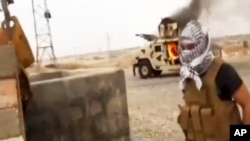LONDON —
Iraqi government forces carried out airstrikes Thursday against fighters from the Islamic State of Iraq and the Levant. The militant group seized several cities from the Iraqi army this week in a move that has caused alarm across the world. Analysts say the militants' advance has called into question the future of the Iraqi state.
Fighters from the Islamic State of Iraq and the Levant (ISIL) are within 100 kilometers of Baghdad, having taken control of several towns and cities in northern Iraq in recent days. Iraqi army units have abandoned their posts and fled ahead of the militants’ advance.
But speaking Thursday, Iraq’s foreign minister, Hoshyar Zebari, insisted that ISIL forces had been halted north of the capital.
"The situation started to be reversed and the Iraqi security forces have managed to re-organize and to push them back," said Zebari.
ISIL grew out of al-Qaida in Iraq. Their stated aim is to create a single Sunni Islamic state across the region.
In an audio recording Thursday, ISIL spokesman Abu Mohammed al-Adnani called for fighters to continue the march to Baghdad.
They are a battle-hardened force, says Shiraz Maher of the International Center for the Study of Radicalization at Kings College London.
“It’s really their experience in Syria that has allowed them to generate this head of steam. Foreign fighters came from all over the world to join that conflict. Overwhelmingly they joined ISIL. Now that group has enjoyed a revival in terms of men, money and munitions," said Maher.
Tens of thousands of Iraqi troops abandoned their posts and fled. Loyalty to Baghdad and to the Iraqi state is weak, says Shiraz Maher.
“The resistance that we should expect to see that will come about in Iraq is going to be from other local militias, other sectarian groupings, the Shias for example,"he said.
There was no shortage of civilian volunteers in Baghdad and other cities Thursday, heeding the government’s call to fight ISIL and chanting "death to terrorists."
Kurdish troops known as Peshmerga from the autonomous northern region of Kurdistan have taken up positions abandoned by the regular Iraqi army. But the Kurds face a dilemma, says Ranj Alaaldin, of the London School of Economics.
“Do they want to be dragged in to a conflict which, at the moment, isn’t really theirs? This is more an Arab conflict, a Sunni-Shia conflict. We still haven’t seen a response from the Iraqi state. Once that response happens, then I think the Kurds could assess whether they really do need to get involved," said Alaaldin.
The prospect of a Sunni-Shia regional war is growing, says Professor Jonathan Eyal of the Royal United Services Institute in London.
“An arc of conflict engaging Iraq, Syria and Lebanon, pitting Sunni against Shia Muslims with a proxy war financed by Saudi Arabia and Iran on both sides. It is just about the worst specter that can haunt the Middle East," said Eyal.
Government forces carried out airstrikes against ISIL positions Thursday. Baghdad’s hope is that the militants’ advance can be quickly halted. If it fails, the consequences could be felt across the region.
Fighters from the Islamic State of Iraq and the Levant (ISIL) are within 100 kilometers of Baghdad, having taken control of several towns and cities in northern Iraq in recent days. Iraqi army units have abandoned their posts and fled ahead of the militants’ advance.
But speaking Thursday, Iraq’s foreign minister, Hoshyar Zebari, insisted that ISIL forces had been halted north of the capital.
"The situation started to be reversed and the Iraqi security forces have managed to re-organize and to push them back," said Zebari.
ISIL grew out of al-Qaida in Iraq. Their stated aim is to create a single Sunni Islamic state across the region.
In an audio recording Thursday, ISIL spokesman Abu Mohammed al-Adnani called for fighters to continue the march to Baghdad.
They are a battle-hardened force, says Shiraz Maher of the International Center for the Study of Radicalization at Kings College London.
“It’s really their experience in Syria that has allowed them to generate this head of steam. Foreign fighters came from all over the world to join that conflict. Overwhelmingly they joined ISIL. Now that group has enjoyed a revival in terms of men, money and munitions," said Maher.
Tens of thousands of Iraqi troops abandoned their posts and fled. Loyalty to Baghdad and to the Iraqi state is weak, says Shiraz Maher.
“The resistance that we should expect to see that will come about in Iraq is going to be from other local militias, other sectarian groupings, the Shias for example,"he said.
There was no shortage of civilian volunteers in Baghdad and other cities Thursday, heeding the government’s call to fight ISIL and chanting "death to terrorists."
Kurdish troops known as Peshmerga from the autonomous northern region of Kurdistan have taken up positions abandoned by the regular Iraqi army. But the Kurds face a dilemma, says Ranj Alaaldin, of the London School of Economics.
“Do they want to be dragged in to a conflict which, at the moment, isn’t really theirs? This is more an Arab conflict, a Sunni-Shia conflict. We still haven’t seen a response from the Iraqi state. Once that response happens, then I think the Kurds could assess whether they really do need to get involved," said Alaaldin.
The prospect of a Sunni-Shia regional war is growing, says Professor Jonathan Eyal of the Royal United Services Institute in London.
“An arc of conflict engaging Iraq, Syria and Lebanon, pitting Sunni against Shia Muslims with a proxy war financed by Saudi Arabia and Iran on both sides. It is just about the worst specter that can haunt the Middle East," said Eyal.
Government forces carried out airstrikes against ISIL positions Thursday. Baghdad’s hope is that the militants’ advance can be quickly halted. If it fails, the consequences could be felt across the region.




